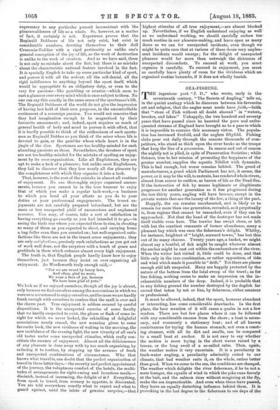THE DEFICIENCY IN ENGLISHMEN'S ENJOYMENTS.
THE dissertations on Sport which August 12th regularly brings us, never fail to remind us of that admirable picture which Anthony Trollope gave us in " The Duke's Children" of Crammie-Toddie, the ugly moorland place in the west of Perthshire as organised for grouse-shooting and deer-stalking by Mr. Reginald Dobbes. " Mr. Dobbes declared that nothing like it had as yet been produced in Scotland. Everything had been made to give way to deer or grouse. The thing had been managed so well, that the tourist nuisance had been considerably abated. There was hardly a fertile patch left in the district, nor a head of cattle to be seen. There were no inhabitants remaining, or so few, that they could be absorbed in game-preserving or cognate duties. Reginald Dobbes, who was very great at grouse, and supposed to be capable of outwitting a deer by venatical wiles more perfectly than any other sportsman in Great Britain, regarded Crummie-Toddie as the nearest thing there was to a Paradise on earth. Could he have been allowed to pass one or two laws for his own protection, there might still have been improvement. He would like to have the right to have all intruders thrashed by the gillies within an inch of their lives; and he would have had a clause in his lease against the. making of any new roads, opening of foot-paths, or building of bridges. He had seen somewhere in print a plan for running a railway from Callender to Fort Augustus, right through Crummie-Todclie. If this were done in his time, the beauty of the world would be over. Reginald Dobbes was a man of about forty, strong, active, well made ; about live feet ten in height, with broad shoulders, and greatly-developed legs. He was not a handsome man, having a protrusive nose, high cheek-bones, and long upper lip ; but there was a man- liness about his face which redeemed it. Sport was the business of his life, and he thoroughly despised all who were not sportsmen. He fished, and shot, and hunted during nine or ten months of the year, filling up his time as best he might with coaching, polo, and pigeon-shooting. He regarded it as a great duty to keep his body in the finest possible condition. All his eating and all his drinking was done upon a system, and he would consider himself to be guilty of weak self-indulgence were he to allow himself to break through sanitary rules." Of Reginald Dobbea's indignation when Crummie-Toddie was described as " infernally ugly," of the bags of game he made, and of his sullen resentment when Lord Silver- bridge left Crum mie•Toddie fora few days to go and flirt at Killen- codlem, a proceeding which he declared to be " hardly honest" seeing that Lord Silverbridge's gun was counted upon to make up the mighty bags of Crummie-Toddie game of which the sporting world was told in the newspapers, Mr. Trollope gave such a picture that no one else can pretend to rival him in painting the type of man who gives up his life to organised sport. Reginald Dobbes grudging every minute and every gun lost to the great cause of making up the grand-total of birds and deer brought down at Crummie-Toddie, remains as a great historical picture of one well-marked type of Englishman,—a type as quaint, as para- doxical, as easy to show to be a priori all but impossible, as it is equally easy to prove it to be, as a matter of experience, not un- common, and in one sense peculiarly national. Certainly, if one had been asked beforehand whether it would be possible to produce a class of men so far devoted to a particular kind of recreation that they would pursue it with the grim professional ardour proper to works of pure obligation, and not only without hoping ever to gain anything except its own characteristic enjoyment by it, but even confidently expecting to spend much of their substance upon it every year, and all this in spite of toil and hardship, in spite of having to choose for the the ttre of sport comparatively dull scenery, where travellers are not attracted, and in spite of being compelled to ignore all those lighter enjoyments which lovers of pleasure usually like to interweave in the intervals of their eagerest pursuit,—ono would, without experience of the facts, have answered in the negative. It would be almost impossible to imagine, a priori, that people devoted to self-indulgence,—as Mr. Trollope admits that Reginald Dobbes was,—would ever make an arbitrary yoke of any one kind of self-indulgence, a yoke which should oblige them to give up every other kind, even the most refined and exalted, and to work like galley-slaves at the particular amusement they had chosen. One would say of course beforehand, that the very devotion to self-indulgence would preclude giving a tyrannical
supremacy to any particular pursuit inconsistent with "the pleasureableness of life as a whole. So, however, as a matter of fact, it certainly is not. Experience proves that the Reginald Dobbeses of life not only exist, but exist in considerable numbers, devoting themselves to their dull Crummie-Toddies with a rigid pertinacity as unlike one's general conception of the joy of life, as the work of destruction is unlike to the work of creation. And as we have said, there is not only no mistake about the fact, but there is no mistake - about the characteristic national feature involved in the fact. It is specially English to take up some particular kind of sport, and pursue it with all the ardour, all the self-denial, all the rigid indifference to anything beyond the sport itself, which would be appropriate to an obligatory duty, or even to the very few passions—like gambling or avarice—which seem to cast a glamour over every mind which is once subject to them. No one can say this exactly in the same sense of the sportsman's life. The Reginald Dobbeses of the world do not give the impression of having lost hold of their own purposes, in the uncontrollable excitement of a sovereign passion. You would not conceive that they had imagination enough to be magnetised by their favourite amusement ; and, indeed, sport requires so much of general health of body and mind to pursue it with effect, that it is hardly possible to think of the enthusiasm of such sports- men as Reginald Dobbes as you think of the miser whose life is devoted to gain, or the gambler whose whole heart is in the jingle of the dice. Sportsmen are too healthy-minded for such absorbing passions as those. Nevertheless, the devotees of sport are not too healthy-minded for the mistake of spoiling an enjoy- ment by its over-organisation. Like all Englishmen, they are apt to make a task of a pleasure; but unlike most Englishmen, they fail to discover that they lose nearly all the pleasure by the completeness with which they organise it into a task.
That, however, is the root of the mistake in almost all routines of enjoyment. No one thoroughly enjoys organised amuse- ments, because you cannot be in the true humour to enjoy that of which you make a regular task-work,—a business to which you bend all your efforts as you do to your duties or your professional engagements. The truest en- joyments are not carefully prepared beforehand, but are the more or less unexpected yield of unconscious and unplanned resource. You may, of course, take a sort of satisfaction in having everything go exactly as you had intended it to go,—in seeing the birds rise where you expected them to rise, in shooting
as many of them as you expected to shoot, and carrying home a bag fuller even than you counted on ; but well-organised satis- factions like these are not in the truest sense enjoyments; they are only satisfactions, precisely such satisfactions as you get out of work well done, not the surprises with a touch of grace and
gratitude in them which enhance almost every high enjoyment. The truth is, that English people hardly know how to enjoy themselves, just because they insist on over organising all enjoyment. As Wordsworth truly enough said,—
" For we are vexed by heavy laws, And often, glad no more,
We wear a face of joy, because We have been glad of yore."
We look as if we enjoyed ourselves, though all the joy is absent, only because we find ourselves among the associations in which we
were once accustomed to enjoy ourselves, and because we are hardly frank enough with ourselves to confess that the spell is over and
the charm past. True enjoyment is seldom secured by careful dispositions. It is the unexpected exercise of some faculty that we hardly suspected to exist, the gleam or flash of some in- sight for which we never looked, the rekindling of delightful associations nearly erased, the new meaning given to some favourite book, the new vividness of waking in the morning, the new restfulness of the evening light, the new vivacity of all one's old tastes under some unexpected stimulus, which really con- stitute the essence of enjoyment. Almost all the deliciousness of any pleasure is done away with by too much organising, by reducing it to routine, by stopping up the avenues of fresh and unexpected combinations of circumstance. Who that
knows what travel is, can doubt that the perfect organisation of travel in these latter days.— the security and perfect appointment of the journey, the voluptuous comfort of the hotels, the multi- tudes of arrangements for sight-seeing and luxurious meals,— diminish, instead of increasing, the delight of lit? Everything, from sport to travel, from scenery to appetite, is discounted. You are told everywhere exactly what to expect and what to guard against, until the inlets of genuine surprise,—that
highest stimulus of all true enjoyment,—are almost blocked up. Nevertheless, if we English understood enjoying as well as we understand working, we should carefully eschew too ranch routine in our pleasure-making, and leave open as many doors as we can for unexpected incidents, even though wp• might be quite sure that at various of these doors very unplea- sant incidents would emerge; for the delight of unexpected pleasure would far more than outweigh the distresses of unexpected discomforts. To succeed at work, you must. organise it carefully. To succeed in enjoyment, you must as carefully leave plenty of room for the vividness which an organised routine benumbs, if it does not wholly banish.



































 Previous page
Previous page